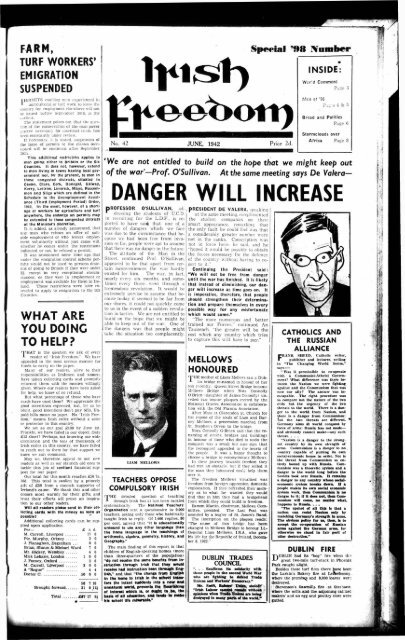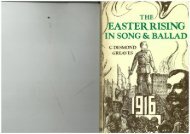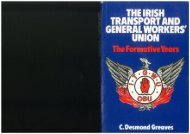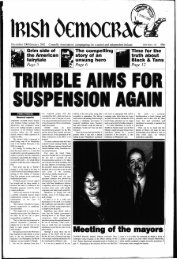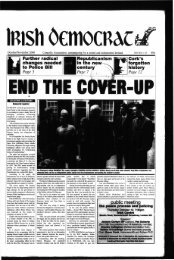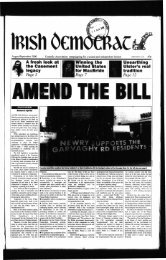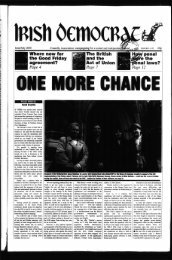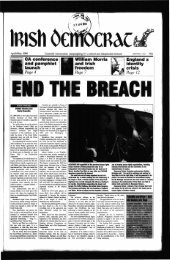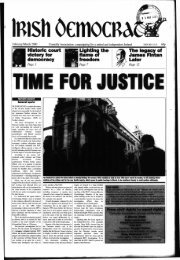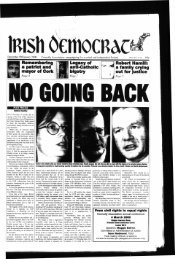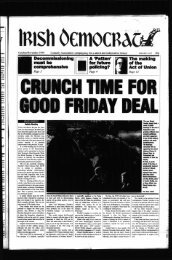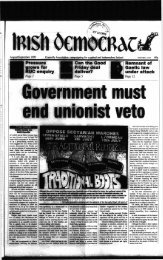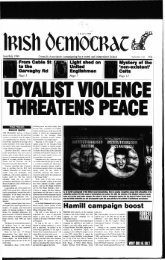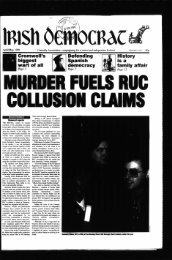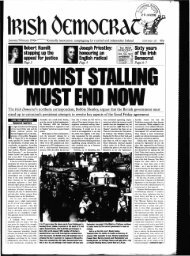Create successful ePaper yourself
Turn your PDF publications into a flip-book with our unique Google optimized e-Paper software.
FARM,<br />
TURF WORKERS'<br />
EMIGRATION<br />
SUSPENDED<br />
)ERMITS enabling men experienced in<br />
1 agricultural or turf work lo leave the<br />
country for employment elsewhere will not<br />
be issued before September 30th, at the<br />
t.irlieot.<br />
The statement points out that the question<br />
of the conservation of the man power<br />
reserve necessary for essential needs has<br />
been constantly under review.<br />
If necessary, it is stated, suspension of<br />
the issue of permits to the classes mentioned<br />
will be continued after September<br />
30th.<br />
This additional restriction applies to<br />
men going either to Britain or the Six<br />
Counties. It does not, however, extend<br />
to men living in towns having local government<br />
nor, for the present, to men in<br />
those congested districts, situated in<br />
Cavan, Clare, Cork, Donegal, Galway,<br />
Kerry, Leitrim, Limerick, Mayo, Roscommon<br />
and Sligo which are defined in the<br />
Schedule to the Unemployment Assistance<br />
(Third Employment Period) Order,<br />
1940. In the event, however, of a shortage<br />
of workers for agriculture and turf<br />
anywhere, the embargo on permits may<br />
be extended to those congested districts<br />
at the Minister's discretion.<br />
It is added, as already announced, that<br />
any man who refuses an offer of suitable<br />
employment or who leaves employment<br />
voluntarily without just cause will,<br />
whether he comes under the restrictions<br />
indicated or not. be refused a permit.<br />
It was announced some time ago that<br />
under the emigration control scheme permits<br />
would not be isued to persons desirous<br />
of going to Britain if they were under<br />
22. except in very exceptional circumstances;<br />
or they were in employment or<br />
employment was available for them in Ireland.<br />
These restrictions were later extended<br />
to apply to emigration to the Six<br />
Counties.<br />
WHAT ARE<br />
Special H8<br />
y ^ e e b o t i )<br />
No. 42 JUNE, <strong>1942</strong> Price 2d.<br />
World<br />
Number<br />
INSIDE:<br />
Comment<br />
Page 3<br />
Men of '98<br />
P.ig:-s 4 & 5<br />
Bread and Politics<br />
Stormclouds over<br />
Page 6<br />
Africa Page 8<br />
'We are not entitled to build on the hope that we might keep out<br />
of the war'—Prof. O'Sullivan.<br />
At the same meeting says De Valera—<br />
DANGER WILL INCREASE<br />
DROFESSOR O'SULLIVAN, addressing<br />
the students of U.C.D.<br />
in recruiting for the L.D.F., is reported<br />
to have said that one of a<br />
number of dangers which we face<br />
was due to the circumstance that because<br />
we had been free from invasion<br />
so far, people were apt to assume<br />
that there was no danger in the future.<br />
The attitude of the Man in the<br />
Street, continued Prof. O'Sullivan,<br />
appeared to be that apart from certain<br />
inconveniences the war hardly<br />
existed for him. The war. in fact,<br />
nearly every six months, and sometimes<br />
every three, went through a<br />
tremendous revolution. It would be<br />
extremely unwise to assume that because<br />
to-day it seemed to be far from<br />
our shores, it could not quickly come<br />
to us in the event of a sudden revolution<br />
in tactics. We are not entitled to<br />
build on the hope that we might be<br />
PRESIDENT DE VALERA, speaking<br />
at the same meeting, complimented<br />
the student companies on their<br />
smart appearance, remarking that<br />
the only fault he could find was that<br />
a considerably greater number were<br />
not in the ranks. Conscription was<br />
not in force here, he said, and he<br />
"hoped it would be possible to obtain<br />
the forces necessary for the defence<br />
of the country without having to resort<br />
to it.''<br />
Continuing the President said:<br />
"We will not be free from danger<br />
until the war has finished. It is likely<br />
that instead of diminishing, our danger<br />
will increase as time goes on. It<br />
is imperative, therefore, that people<br />
should strengthen their determination<br />
and prepare themselves in every<br />
possible way for any misfortunate<br />
which would come."<br />
"The more numerous and better<br />
rPHAT is the question we ask of every<br />
reader of "<strong>Irish</strong> <strong>Freedom</strong>." We have<br />
appealed in the most serious manner for<br />
MELLOWS<br />
funds to carry on the paper.<br />
Many of our readers, alive to their<br />
HONOURED<br />
responsibilities as <strong>Irish</strong>men and women,<br />
THE mother of Liam Mellows saw a Dublin<br />
bridge re-named in honour of her<br />
have taken collecting cards and promptly<br />
returned them with the monies willingly<br />
son recently. Queen Street Bridge became<br />
given. Where our readers have been asked<br />
Mellows Bridge when Nora Connolly<br />
for help, we know of no refusal.<br />
O'Brien idaughter of James Connolly) unveiled<br />
two bronze plaques erected by the<br />
But what percentage of those who have<br />
cards have used them? We appreciate the<br />
National Graves Association in collaboration<br />
with the Old Fianna Association.<br />
good intentions expressed, but, let us be<br />
blunt, good intentions don't pay bills. Unpaid<br />
bills mean no paper. No "<strong>Irish</strong> <strong>Freedom</strong>."<br />
means <strong>Irish</strong> exiles without a voice<br />
After Mass at Clarendon St. Church for<br />
the repose of the souls of Liam and Barney<br />
Mellows, a procession marched from<br />
or protector in this country.<br />
We set as our goal £100 by <strong>June</strong> 1st.<br />
St. Stephen's Green to the bridge.<br />
Frankly, we have failed in our object. Only<br />
Nora Connolly O'Brien said that the renaming<br />
of streets, bridges and buildings<br />
£12 short? Perhaps, but knowing our wide<br />
circulation and the tens of thousands of<br />
in honour of those who died to undo the<br />
<strong>Irish</strong> exiles in this country, we have failed<br />
conquest was a small but sure sign that<br />
to reach out to them for that support we<br />
the reconquest appealed to the hearts of<br />
know we can command.<br />
the people. It was a happy thought to<br />
May we, therefore, appeal to our new<br />
choose a bridge to commemorate Mellows.<br />
readers as well as our staunch old ones to<br />
LI AM MELLOWS<br />
In their journey towards freedom they<br />
tackle this job of constant financial support<br />
for our paper.<br />
had met an obstacle, but if they willed it<br />
the man they honoured cou'.ti help them<br />
Our total for this month reaches £56 7s.<br />
over it.<br />
lOd. This total is swollen by a princely TEACHERS OPPOSE<br />
The freedom Mellows visualised w r as<br />
gift of £50 from a staunch supporter of<br />
freedom from foreign oppression, domestic<br />
Ireland's cause. We thank this and other COMPULSORY IRISH exploitation. If they refreshed their memory<br />
as to what he wanted they would<br />
r pHE debated question of teaching<br />
donors most warmly for their gifts, and<br />
trust their efforts will prove an inspiration<br />
to our other readers.<br />
find that in him they had a bridgehead<br />
J- through <strong>Irish</strong> has at last been tackled from which they could build to freedom.<br />
systematically. The National Teachers'<br />
Will all readers please send in their collecting<br />
cards with the money as soon as<br />
Eamon Martin, chairman. Mellows Committee,<br />
presided. The Last Post was<br />
Organisation sent a questionaire to 9,000<br />
teachers, asking only those who habitually<br />
possible?<br />
sounded by a bugler of St. James's Band.<br />
taught <strong>Irish</strong> to reply. Of 1,400 replies, 80<br />
Additional collecting cards can be supplied<br />
upon application.<br />
The inscription on the plaques reads:<br />
per cent, agreed that "it is educationally "The name of this bridge has been<br />
unsound to use any other language than<br />
Per— £ s. d.<br />
changed to Mellows Bridge to honour Lt.-<br />
the home language in the teachings of<br />
M. Carroll, Liverpool 17 6<br />
General Liam Mellows, I.R.A.. who gave<br />
arithmetic, algebra, geometry, history, and<br />
Pte. Murphy, Orkney 3 0<br />
Ms life for the Republic of Ireland, December<br />
8, 1922."<br />
Geography."<br />
J. Flanaghan, Dagenham ... 8 6<br />
Brian, Shaun & Michael Ward 7 6 The main finding of this report is that<br />
Mr. Jllckey, Wembley 4 6 children of English-speaking homes (more<br />
Mick Letaane, London 1 0 0 than three-quarters of the population)<br />
DUBLIN TRADES<br />
J. Feeney, Oxford 2 6 "do not receive the same benefits from instruction<br />
through <strong>Irish</strong> that they would<br />
COUNCIL<br />
M. Carroll, Liverpool 3 0 0<br />
A "Rogue" 4 4 receive had instruction been through English,"<br />
and that "the change from Engllch those people in the second World War<br />
". . . Reaffirms Its solidarity with<br />
Doctor C 50 0 0<br />
In the home to <strong>Irish</strong> in the school transfers<br />
the Infant suddenly into a new and<br />
who are ftghUnf to defend Trade<br />
Unions and Workers' Democracy."<br />
58 7 10<br />
Brought forward 31 8 UJ unnatural world, prevents the flourishing Mr. Swift, Bakers' Union, state**<br />
of Interast which is, or ought to bo, the<br />
"<strong>Irish</strong> Labour eaoast remain without<br />
opinion* when Trade Unions are being<br />
Total ....;... £87 17 9} basis of all education, and tends to make<br />
destroyed In many pacts of the world."<br />
his school life miserable."<br />
F<br />
CATHOLICS AND<br />
THE RUSSIAN<br />
ALLIANCE<br />
RANK SHFED, Catholic writer,<br />
publisher and lecturer, writing<br />
in "The Changing World Series,"<br />
says:—<br />
" Was it permissible lo co-operate<br />
with a Communist-Atheist Government?<br />
What difference was there between<br />
the Nazism we were fighting<br />
against and the Communism that was<br />
now our ally? The answer was inescapable.<br />
The right procedure was<br />
to compare not the nature of the two<br />
evils but the urgency of the two<br />
threats to the world. There is a danger<br />
to the world from Nazism, and<br />
there is a danger from Communism:<br />
but the two threats are different. '<br />
Germany aims ift world conquest by<br />
force of arms: Russia has not made—<br />
and obviously cannot make—any such<br />
threat. . . .<br />
"Nazism is a danger to the strongest<br />
country by its own strength of<br />
arms. Communism is a danger to no .<br />
country capable of putting its own<br />
social-economic house in order. Nor is<br />
the threat from Communism so entirely<br />
bound up with Russia. Communism<br />
was a theoretic system and a<br />
danger to the world long before the<br />
Soviets took over Russia. It remains<br />
a danger to any country whose socialeconomic<br />
system breaks down. If a<br />
people makes its own social economic<br />
system work, then Communism is no<br />
danger to it; if it does not, then Communism<br />
will come, no matter what,<br />
happens to Russia. . . .<br />
"The upshot of all this is that a<br />
nation can resist Nazism only by<br />
matching Germany's strength in arms.<br />
The obvious policy for us, then, Is to<br />
accept the co-operation of Russian<br />
arms against the German arms, for<br />
otherwise we stand in fair peril of<br />
utter destruction."<br />
D<br />
DUBLIN<br />
FIRE<br />
UBLIN had its "bog" fire when th?<br />
great two-mile turf-stack In Phcenix<br />
Park caught alight.<br />
Besides these turf fires there have been<br />
the Larkln's Bakery fire at Lefterkenny.<br />
where the premls*^ and 8,000 loaves wer.;<br />
destroyed.<br />
i i Stevenson's Sawmills fire at Stra'oane.<br />
where the mills and the adjoining cat net<br />
makers' and an egg and poultry store were<br />
gutted.
2 IRISH FREEDOM <strong>June</strong>, <strong>1942</strong><br />
Marching<br />
On ...<br />
I X spur ol exceptional difficult:* s due<br />
" o ;he ur
4 IRISH FREEDOM 5<br />
— Who fears to speak of Ninety-eight,<br />
= Who blushes at the name?<br />
~ When cowards mock the patriots' fate,<br />
= Who han?s his head for shame?<br />
= He's all a knave or half a slave<br />
n<br />
Who slights his country thus;<br />
11 But a true man, like you, man.<br />
Will till your glass with us.<br />
= Some on the shores of distant land<br />
= Their weary hearts have laid,<br />
EE<br />
And by the stranger's heedless hand<br />
= Their lonely graves were made;<br />
EE<br />
But, though their clay be far awav<br />
E<br />
Beyond the Atlantic foam,<br />
EE<br />
In true men, like you, men,<br />
EE<br />
Their spirit's still at home.<br />
~ They rose in dark and evil days<br />
— To right their native land;<br />
= They kindled here a living blaze<br />
EE<br />
That nothing shall withstand.<br />
= Alas! that Might can vanquish Right—<br />
= They fell, and passed away;<br />
= But true men, like you, men,<br />
= Are plenty here to-day.<br />
H<br />
Then here's their memory—may it be<br />
— For us a guiding light,<br />
= To cheer our strife for liberty,<br />
EE<br />
And teach us to unite!<br />
= Through good and ill, be Ireland's still,<br />
= Though sad as theirs your fate;<br />
= And true men, be you, men,<br />
= Like those of Ninety-Eight.<br />
= JOHN KELLS INGRAM.<br />
I<br />
I<br />
I<br />
I<br />
United <strong>Irish</strong><br />
Catechism<br />
1 believe in the <strong>Irish</strong> Union; in the<br />
supreme majesty of the people; in the<br />
equality of man; in the lawfulness of<br />
insurrection, and of resistance to oppression.<br />
I De.iev-u in a Revolution founded on the<br />
rights of man; in the natural and imprescriptable<br />
rights of all the <strong>Irish</strong> citizens<br />
to all the land. I believe the soil or<br />
any part of it cannot be rightfully<br />
transierred without the consent of the<br />
people or their representatives, convened<br />
and authorised by the votes of<br />
every man having arrived at the age of<br />
twenty-one years.<br />
j believe the land or any of it cannot become<br />
the property of any man, but by<br />
purchase, or as a reward for forwarding<br />
ana preserving the public liberty,<br />
believe our present connection with England<br />
must be speedily dissolved,<br />
believe that old age, pregnant<br />
women<br />
and labour should be honoured,<br />
believe that treason is the crime of betraying<br />
the people.<br />
believe religious distinction (i.e., favouring<br />
discriminations) are only protected<br />
by tyrants.<br />
believe applying the lands of the Church<br />
to relieve old age, to give education and<br />
protection to infancy, will be more acceptable<br />
to a united people than maintaining<br />
lazy hypocrites or ravenous title<br />
gatherers.<br />
this faith I mean to live, or bravely die.<br />
What art you?<br />
An <strong>Irish</strong>man.<br />
As an <strong>Irish</strong>man, what do you hope tor?<br />
The emancipation of my country, and<br />
equality of rights, a fair division of the<br />
land, and abolition of religious<br />
establishments,<br />
and representative government.<br />
What advantage can our poverty be to<br />
our lawmakers?<br />
By being poor we must be on the alert,<br />
to procure the necessarjes of life, which<br />
makes true the old maxim, They keep<br />
us poor and busy.<br />
Our time will be<br />
spent studying to avoid want<br />
instead<br />
of inquiring into the cause of it, for<br />
inquiry is dangerous to tyrants.<br />
What good could a fair division of the<br />
land be to Ireland?<br />
As the land and<br />
its produce was intended<br />
for the use of man, it is unfair<br />
for fifty or a hundred men to possess<br />
what is for the subsistence of near five<br />
millions: it exposes the great body of<br />
the people to sorry want and every<br />
misery. . . It is not possible that God<br />
can be pleased to see a whole nation depending<br />
on the caprice and pride of a<br />
small faction, who can deny the common<br />
property in the land to the people,<br />
or at least tell them<br />
how much they<br />
should eat and what kind; how #uch<br />
they shall wear and what kind.<br />
How shall we arrive at the blessings so<br />
oertam from independence?<br />
By a union of ALL the people.<br />
Do you want the privileged order in this<br />
union?<br />
No. Were we to wait their concurrence,<br />
our delivery would be as distant as the<br />
general death of Nature.<br />
What do you mean should compose<br />
this union?<br />
Every man who Is oppressed; every<br />
man that labours; every honest man of<br />
every religion.<br />
In<br />
Q-<br />
A.<br />
Q-<br />
A.<br />
Q.<br />
A.<br />
TO "IRISH FREEDOMON THESE PAGES, PAYS TRIBUTE<br />
THE<br />
MEN<br />
/ vROINARILY one would expect women<br />
" to be more of a liability than an asset<br />
on a battle-field.<br />
But, as we are all learning<br />
nowadays, this is not always the case.<br />
Women in service uniforms are commonplace<br />
to-day.<br />
They were undreamed of in<br />
1798. Women did find a function, of sorts,<br />
as common camp followers, and among the<br />
sutlers' supply-waggons—the commissariat<br />
in those days being still left largely<br />
to<br />
private enterprise.<br />
There was no Army Service Corps<br />
in<br />
the British Army till Wellington<br />
organised<br />
one during the Peninsular Campaign;<br />
and it is notorious that there was no<br />
women's nursing service for the<br />
British<br />
Army till Florence Nightingale organised<br />
one during the Crimean War.<br />
These facts throw into relief the innu t<br />
merable ways in which women supplied all<br />
these services for the rebel armies in Ireland<br />
in 1798.<br />
In Wexford particularly the men joined<br />
the rising almost to a man: and the<br />
women, rather than stay in their homes<br />
at the mercy of any band of wandering<br />
Orange yeomen or militia, joined the rebel<br />
camps, where not only were they far safer,<br />
and protected from insult, but could make<br />
themselves useful in a score of ways.<br />
They attended to the washing, mending<br />
and cooking; they helped to make<br />
cartridges;<br />
they nursed the sick; and foraged<br />
for supplies.<br />
She had phenomenal strength, and had<br />
been accustomed to help her father with<br />
a sledge-hammer at the anvil.<br />
She had<br />
also great acuteness. a ready wit, and a<br />
most plausible tongue.<br />
She was, in addition,<br />
possessed of a power of disguising<br />
her appearance and even her features. Her<br />
courage was as great as her strength; and<br />
her fidelity was greatest of all.<br />
She ranged the countryside hawking<br />
gingerbread and fruit from a basket, covering<br />
many miles a day and<br />
gathering<br />
every scrap of information there, was<br />
about the disposition and movements of<br />
the troops.<br />
And also in wheedling cartridges<br />
out of the soldiers, especially those<br />
whose allegiance was shaky.<br />
She got large quantities. She rarely returned<br />
without several hundred cartridges<br />
concealed about her, and the information<br />
she gathered enabled Holt and his men<br />
to evade capture for months; until, in<br />
fact, Holt surrendered under the Amnesty<br />
Act.<br />
* * * '<br />
When Emmet's lodgings were searched.<br />
Ann was arrested, and, as we would say<br />
nowadays, "put through the third degree."<br />
They told her they would hang her there<br />
and then, and up-ended a cart in the yard<br />
to hang her between the shafts by a rope<br />
over the breeching-band. While this improvised<br />
gallows was being got ready, they<br />
thrust her against a wall and pricked her<br />
The Women<br />
Guerillas<br />
Myles Byrne records how, when a quantity<br />
of flour fell into rebel hands, the<br />
young women turned to and baked a quantity<br />
of flat cakes, bannocks and "flapjacks"<br />
to eat with the meat of the sheep that<br />
were captured at the same time. He notes<br />
this, forty years after the event, and remembers<br />
how particularly welcome this<br />
addition to their diet was to the tired<br />
army.<br />
Of women who nursed the wounded devotedly<br />
there were, of course, innumerable<br />
cases.<br />
So there were of women who hid<br />
fugitives and helped them to escape. But<br />
there are at least three cases of women<br />
who played a conspicuous part in the<br />
actual fighting; and one more who set a<br />
shining example.<br />
In the rising in Co. Down, Betsy Grey<br />
of Killinchy went to the camp of the<br />
rebels near Ballinahinch with some supplies<br />
for her brother and her sweetheart<br />
in the army.<br />
This was the service most<br />
commonly performed by women in '98; but<br />
Betsy Grey departed from the custom<br />
when she decided to stay with her brother<br />
and her sweetheart for the battle<br />
then<br />
imminent.<br />
They found her a pony, and carrying a<br />
green flag, she led the company into<br />
action.<br />
She, her brother and her sweetheart<br />
all kept together in the retreat after<br />
the defeat, at Ballinahinch; and all three<br />
were murdered together by the yeomanry.<br />
Nancy Doyle, a faggot-cutter's daughter,<br />
behaved with conspicuous gallantry<br />
during<br />
the prolonged and bloody struggle to<br />
capture New Ross in the Wexford rising.<br />
Eye-witnesses report that she "seemed<br />
to bear a charmed life."<br />
Moving to and<br />
fro when the battle raged most<br />
fiercely,<br />
she used one of her father's faggot-hooks<br />
to cut the belts from the enemy soldiers<br />
who had fallen, to get the cartridges from<br />
their leather pouches.<br />
These she distributed<br />
to the rebels, who were desperately<br />
short of ammunition.<br />
At the end of the day when the rebel<br />
army was in retreat, she saved a cannon<br />
which they were going to abandon.<br />
Taking<br />
her stand by it. she swore she would<br />
wait there to be shot unless they were men<br />
enough to carry it off.<br />
She succeeded In<br />
rallying a party and together they saved<br />
the cannon.<br />
* • *<br />
Susie 0Toole was a blacksmith's daughter<br />
of Amtamoe, Co, Wicklow.<br />
She gave<br />
invaluable awistfince to the famous Wicklow<br />
chief, Joseph Holt, who called her his<br />
"moving magazine."<br />
by T. A. Jackson |<br />
arms and shoulders with their<br />
bayonets<br />
till she was covered with blood.<br />
"Will you confess now?" they said, as<br />
they jabbed.<br />
She stuck to her one answer,<br />
"I will tell you nothing."<br />
They put the noose around her neck,<br />
under the "gallows."<br />
"Will you confess<br />
now?<br />
It's your last chance."<br />
"You may murder' me," she said, "but<br />
not a word will you get out of me!"<br />
They hoisted her on the rope till only<br />
her toes touched the ground, and her<br />
senses had nearly left her. Then they gave<br />
up, and carried her off to gaol.<br />
In prison<br />
they pestered her repeatedly, until her<br />
health was destroyed and even her mind<br />
became partially deranged.<br />
In the end<br />
they turned her adrift, without a home to<br />
go to—her father had been killed—without<br />
a relative in the world.<br />
But never a word did they get from Ann<br />
Devlin; and never while she lived would<br />
she tolerate a wTong word said against<br />
Robert Emmet or his cause.<br />
* * *<br />
These are a few only^f the women who<br />
served in '98 and 1803. Their like has been<br />
found every time the need has arisen; and<br />
their like 4s—who can doubt it?—here today<br />
as ready to serve as ever.<br />
To those we have named we must add<br />
Ann Devlin as typical of the great body<br />
of <strong>Irish</strong>women who had given devoted service<br />
in all the revolutionary<br />
liberation<br />
struggles in Ireland.<br />
Ann Devlin was a peasant girl of<br />
twenty-four who was sent by her father<br />
to help in one of Robert Emmet's munition<br />
depots and to act as household servant to<br />
Emmet himself.<br />
Ann was working at the depot on the<br />
fateful <strong>June</strong> 23rd, 1803, when Emmet made<br />
his abortive attempt.<br />
She was despatching<br />
a messenger on horseback with a sackful<br />
of cartridges she had helped to make,<br />
and a quantity of hand-grenades Emmet<br />
had devised (made out of ink bottles filled<br />
with powder and coated with buck-shot<br />
embedded in cement) when Emmet and a<br />
few companions returned disheartened<br />
and dejected.<br />
To her challenge Emmet himself replied,<br />
"It Is me, ,Ann!"<br />
"Musha! Bad welcome to you, then!"<br />
Ann replied. "Is the world lost by you, you<br />
cowards, that you lead the people to destruction<br />
and then leave them?"<br />
Emmet could only answer, sadly, "The<br />
fault is not piine, Ann." •_._*.".<br />
While Emmet hid in the mountains, Ann<br />
carried letters to hhn.* She carried his<br />
letters to Sarah Curran.<br />
A MONG the stirring episodes<br />
;:> nip<br />
= - * centufies-old struggle of u;< ivj'-n<br />
EE people for freedom, the memory 1798 is<br />
= treasured by <strong>Irish</strong> men and women.<br />
Mention Corn<br />
Market in Belfast, and<br />
= you will be told, there Henry jay<br />
= McCracken was hung in '98. With pride<br />
EE<br />
they will point to McArts Fort juttinti out<br />
= on Cave Hill and relate how 011 that 'loftv<br />
= peak, Wolfe Tone, with his Belfast sup-<br />
EE porters Neilson, Russell and McCracken,<br />
= met and made their famous Declaration of'<br />
EE<br />
the Rights of Man in Ireland.<br />
= To understand the '98 Rebellion it is<br />
= necessary to revert to 1791. The Northern<br />
= Whig Club was formed by Lords Charle-<br />
EE<br />
mont and Moira in Belfast in that year.<br />
= Theobald Wolfe Tone was elected a mem-<br />
EE ber of this Club. A young barrister, he<br />
== was born in Dublin in 1763 and educated<br />
= at Trinity College. Disappointed with the<br />
IE<br />
Whig Club and inspired by the French<br />
EE<br />
Revolution, Tone formed the first Lodge<br />
= of the United <strong>Irish</strong>men in Belfast in<br />
EE<br />
October, 1791. The objects of this Society<br />
= were outlined in their famous Declaration<br />
= of the Rights of Man in Ireland.<br />
1 | UNION OF ALL CREEDS<br />
=z ritHESE were briefly, the Emancipation of<br />
EE<br />
Ireland from English rule; the Re-<br />
= form of Parliament, and the cordial Union<br />
EE of all Creeds. The international oittlodk<br />
EE<br />
of the United <strong>Irish</strong>men and their anituce<br />
= to the ruling class in society is best shown<br />
= by the following quotation from ths<br />
EE<br />
declaration:<br />
= "When the aristocracy come forward<br />
the people fall backward; when tie<br />
EE people come forward, the aristocraci,<br />
EE<br />
fearful of being left behind, insinua e<br />
EE themselves into our ranks and rise in 0<br />
= timid leaders or treacherous auxiliaries<br />
= They mean to make us their instn 1-<br />
ments.<br />
Let us rather make them our instruments.<br />
One of the two must happe 1.<br />
The people must serve the Party, or tie<br />
Party must emerge in the mightiness if<br />
the people, and Hercules will then leai<br />
on his club.<br />
On the 14th July, the da»<br />
which shall ever commemorate Us<br />
French Revolution, let this Society potr<br />
by Joh<br />
peasantry, and floggings and tortures were<br />
the order of the day. Tone was still busy<br />
EE<br />
soliciting aid on the Continent, but his =<br />
hopes were disappointed when a Dutch £<br />
fleet was defeated by the British off Cam-<br />
E<br />
perdown. =<br />
On 12th March, 1797, police seized mem- =<br />
bers of the Dublin Committee of the E<br />
Society and two months later Lord Edward =<br />
Fitzgerald was wounded during arrest and<br />
EE<br />
died in Newgate Prison two months later.<br />
EE<br />
The brothers Sheares were hung at New- =<br />
gate.<br />
^<br />
In May the people rose in armed rebel- =<br />
lion. At Prosperous, in Co. Kildare, peas- =<br />
ants armed with pikes captiTred the mili-<br />
EE<br />
tary barracks. Attacks were also made at =<br />
Naas, Tara, Carlow and the Curragh, but<br />
EE<br />
at these towns the insurgents were de-<br />
EE<br />
feated. * =<br />
In Co. Wexford notable successes were =<br />
gained. On Saturday, 26th May, the signal<br />
E<br />
for rebellion was a beacon lit on the sum- =<br />
mit of Carrigruahill, ten miles outside =<br />
Ferns. By m a day a party of 5,000 men =<br />
was formed at Oulart under the leadership =<br />
of Fathers John and Michael Murphy. =<br />
Moving next day on Enniscorthy, they de-<br />
EE<br />
feated the North Cork Militia and captured =<br />
the town. Retreating to Wexford, the EE<br />
British troops were compelled to evacuate<br />
EE<br />
that town also. The Green Flag was =<br />
hoisted over the town, and the prisoners<br />
EE<br />
held there were released.<br />
EE<br />
BAGENAL HARVEY =<br />
A MONG these was Bagenal Harvey, who<br />
EE<br />
took command of the peasant force. =<br />
Under his leadership they advanced on<br />
E<br />
New Ross, intending an ultimate march<br />
EE<br />
on Dublin. At New Ross his forces were =<br />
defeated after a stubborn fight in which<br />
E<br />
Lord Mountjoy, commander of the Dublin<br />
E<br />
Militia, was killed. =<br />
Another force under Father John E<br />
Murphy advanced on Arklow, Co. Wicklow. =<br />
Here again the peasantry were defeated,<br />
E<br />
Father Murphy being killed. British E<br />
forces then converged on Vinegar Hill. The<br />
E<br />
<strong>Irish</strong> forces, outnumbered and vastly in-<br />
E<br />
inferior in equipment, were defeated after =<br />
fierce and bloody battle. This was the be-<br />
E<br />
ginning of the end of '98.<br />
E<br />
I<br />
O f<br />
EE<br />
°ut their first libation to European lil •<br />
erty, eventually the liberty of the worli,<br />
= and with eyes raised to Heaven, in h i<br />
EE<br />
presence let them swear to maintain tl i<br />
EE<br />
rights and prerogatives of their natui s<br />
= as men, and the right and prerogative < I<br />
Ireland as an independent people."<br />
GOVERNMENT ALARM<br />
|N July 14th, 1791, Belfast celebratt I<br />
the anniversary of the Storming < [<br />
EE<br />
the Bastille in Paris. Crowds swarmed b •<br />
= hind the revived Volunteers, who marcht I<br />
E with bands and flags to the Linen Ha .<br />
= The day's proceedings closed with a dinir :<br />
EE at which the toasts were Mirebeau, lead' 1<br />
EE<br />
of the Frenfh Revolution, Washington ar I<br />
r: Franklin, who led the Americans in the 1<br />
E fight for independence, and Molyneat I<br />
E and G rattan, representative of Iris 1<br />
= nationality.<br />
E The strength of the United <strong>Irish</strong>mt 1<br />
E grew rapidly. The Government gre<br />
= alarmed, and in 1795 the Society was su;<br />
E<br />
pressed and Tone was forced to sail wit<br />
= his family to America, continuing his act<br />
E vities on behalf of the Society. The fc<br />
= lowing year he left for France to solic<br />
EE French aid for the purpose of freeir<br />
E<br />
Ireland.<br />
= In Ireland the spirit of the people h£<br />
= grown in determination to free their lan<br />
EE Lord Edward Fitzgerald also appealed f<<br />
E= help in France. The peasantry secret<br />
E<br />
armed themselves. Distrusting the militi<br />
E<br />
the landowners obtained permission fro:<br />
= the Government to form their own ye<br />
= manry. On 15th December, 1796, a Frenc<br />
E fleet left Brest under command of Ge<br />
= Hoche. Tone sailed with them on boai<br />
E the Indomitable.- Meeting with storrr<br />
EE<br />
weather, the fleet scattered, and eventi<br />
= ally fourteen ships anchored in Banti<br />
EE Bay. No landing was attempted, and tr<br />
= fleet returned to Prance.<br />
MARTIAL<br />
LAW<br />
EE ritHE Government proclaimed martfc<br />
= - 1 - law in Antrim, Down, Derry an<br />
E Donegal, and the United <strong>Irish</strong>men 1<br />
= paper, the "Northern Star," was su]<br />
= pressed and a number pf members of u<br />
= Committee were arrested in Belfast, ir<br />
g<br />
. troops and ytomanrv were loosed on tr<br />
1 Griffin<br />
The leaders of the United <strong>Irish</strong>men,<br />
Thomas Emmett, Arthur O'Connor,<br />
M'Nevin and others, were sent into detention<br />
at Fort George in Scotland.<br />
In the North, the United <strong>Irish</strong>men<br />
under Henry Jay McCracken attacked<br />
Antrim; Newtownards and Saintfield were<br />
seized by the Down men under the leadership<br />
of Henry Munro.<br />
Attacked by Gen.<br />
Nugent's forces, they were finally defeated<br />
at the battle of Ballynahinch.<br />
Munro was<br />
hanged at Lisbourn, and McCracken at<br />
Belfast.<br />
In August, Tone's efforts in France succeeded,<br />
and another expedition under Gen.<br />
Humbert sailed for Ireland. On 22nd August<br />
they landed at Killala, Co. Mayo. Mat^<br />
thew Tone accompanied them as representative<br />
of the <strong>Irish</strong> people.<br />
Lord Cornwallis<br />
finally surrounded these forces and<br />
compelled them to surrender at Ballinarnuck.<br />
Matthew Tone was hanged immediately.<br />
TOO LATE<br />
r PHE French forces had arrived too late<br />
to help the insurrection. Sailing from<br />
Brest aboard the French ship the Hoche,<br />
Wolfe Tone arrived off Loch Swilly on<br />
October 10th. Attacked by the British warships,<br />
the Hoche was forced to surrender.<br />
Tone was imprisoned.<br />
' Sentenced by a<br />
courtmartial to be hanged, he was found<br />
that same night in his cell bleeding from<br />
a wound in his throat.<br />
Execution of his<br />
sentence was postponed on legal grounds,<br />
and he died from the effects of his wound<br />
on November 19th, 1798.<br />
The memory of '98 burned into the<br />
minds of the <strong>Irish</strong> people and will remain<br />
for ever.<br />
Wolfe Tone will always be doar<br />
to them, and the annual pilgrimage to his<br />
Pave at Bodenstown continued each year<br />
until It was Hipprosaad by an <strong>Irish</strong> Gov-'<br />
wtnwit.<br />
The United <strong>Irish</strong>men, led in the<br />
"lain by Protestants, proved in the words<br />
°(Jim Connolly 1<br />
"Thatth* pressure of a common exploitation<br />
ean make enthusiastic<br />
rabafs<br />
°ut * • Protestant work in* eftd* earne*t<br />
champions of civil and religious<br />
"borty out of Catholics, and out of both<br />
• United 8oclal Democracy.-! „..".,<br />
_<br />
llltll»HIHWWHHH»IIHHIimHWHMHHHIIttlHimi»W<br />
OF '98<br />
A MONG the many who have given their<br />
lives in the struggle to make Ireland<br />
a Nation, few deserve a higher place on<br />
the roll of fame than Tone's friend and<br />
Robert Emmet's companion, Thomas<br />
Russell.<br />
Born in Co. Cork 011 November 21st, 1767,<br />
the son of an Army officer, Russell was<br />
himself an officer in the Army when he<br />
made Tone's acquaintance<br />
in Dublin in<br />
1789. They had become close friends when<br />
Russell and his regiment were moved to<br />
Belfast.<br />
Here Russell made the contact<br />
with the more advanced Whigs—Neilson.<br />
McCork, the Seimans, and others—which<br />
resulted in his calling-in the aid of Tone,<br />
from which in turn resulted the foundation<br />
of the Society of United <strong>Irish</strong>men in<br />
October, 1791.<br />
In the work of founding the Society,<br />
Tone and Russell toured the district<br />
around Belfast; and to their joint efforts<br />
and the backing of Samuel Neilson the<br />
successful launching was due.<br />
Tone in his autobiography gives unstinted<br />
praise to Russell and his work; in<br />
fact, words were never better deserved<br />
than Patrick Pearse's over the grave of<br />
Tone: "I have always loved the very name<br />
of Thomas Russell because Tone so lovea<br />
him."<br />
Yet Tone, unwittingly, has been the<br />
cause of many mistaking completely the<br />
nature and quality of Russell.<br />
ing him by winning the less advanced<br />
Whigs over to the agitation for Catholic<br />
Emancipation which the United <strong>Irish</strong>men<br />
carried on at the same time as the Catholic<br />
Committee agitated on its own behalf.<br />
Tone in his diary describes how Russell<br />
gave an eloquent and spirited "history of<br />
the negotiations" of the Catholic Committee<br />
and the United <strong>Irish</strong>men which "history"<br />
Tone applauds highly.<br />
Then adds<br />
Tone,<br />
"decided on the spot to christen<br />
Russell 'P.P., clerk of this parish.' "<br />
Why?<br />
To answer this query, one must<br />
see the volume of "Miscellaneous Papers"<br />
included in the works of Swift, and there<br />
among a number of "squibs" concocted<br />
jointly by Swift, Pope, Arbuthnot and<br />
Gay, the curious will find, under the title<br />
of "Memoirs of P.P., clerk of this Parish,"<br />
a highly ribald parody of Burnet's History<br />
of his own Times.<br />
The jest is another pull at Russell's<br />
"leg," and derives its point from Burnet's<br />
old-womanish tendency to dwell upon all<br />
sorts of trivial detail, and from the fact<br />
that both Tone and Russell knew intimately<br />
and relished highly the work of<br />
Swift.<br />
* * *<br />
TiUSSELL'S standing in the Society of<br />
United <strong>Irish</strong>men is more than sufficient<br />
to acquit him of both charges. He 1<br />
was. until he was arrested in September,<br />
1796. the chief military commander of the<br />
Salute to<br />
Thomas Russell<br />
TN<br />
the life of his father which Tone's<br />
J- son compiled from the papers Tone<br />
left behind him, there was included Tone's<br />
diaries so far as they have survived.<br />
These are of such inestimable merit that<br />
they make the book stand out unrivalled<br />
among works of its kind.<br />
But inattentive readers are apt to forget<br />
that the diaries were begun to serve the<br />
purpose of a narrative-letter for the diversion<br />
of Tone's wife and sister. And as Tone<br />
loved a joke and was travelling with Russell,<br />
it was only to be expected that he<br />
should crack all sorts of jokes at Russell's<br />
expense. (Russell, it must be remembered,<br />
read the diary as it was written, as the<br />
"girls" for whom it was written well<br />
knew.)<br />
Thus, when Tone refers to Russell as<br />
"very drunk," "swearing horribly," "gloriously<br />
drunk," and "highly disorderly,'<br />
anyone knowing his Tone and the circumstances<br />
knows that if these things<br />
had<br />
been merely true, Tone<br />
would not have<br />
troubled to record them.<br />
The point of the<br />
jest was that Russell had been intended<br />
for the Church,<br />
and in a hard-drinking<br />
and hard-swearing age, was abstemious<br />
both in his use of wine and strong language;<br />
while Tone, one gathers, was quite<br />
able to make up for Russell's deficiencies<br />
in both fields.<br />
Not that Tone was a drunkard, or foulmouthed.<br />
He was a "good mixer," and<br />
could keep up with his company in any<br />
field they chose. That is apparent from<br />
the esteem and affection he aroused<br />
in<br />
men vastly alien to his political outlook—<br />
men like the Duke of Wellington with<br />
whom Tone had played when they were<br />
both children.<br />
But if it be folly and worse to set down<br />
Russell as nothing but a toper from a misreading<br />
of Tone's "leg-pulls," the opposite<br />
view, which some have taken—that Russell<br />
was a dull, solemn puritan, is an equally<br />
absurd misinterpretation.<br />
It derives from Tone's playful trick of<br />
giving his friends nicknames, and when he<br />
christened Russell "P.P., clerk of this parish,"<br />
the mischief was done for this<br />
humourless school of expositors.<br />
I grant that the joke here calls for<br />
more erudition than these expositors commonly<br />
possess, but it is a joke all<br />
the<br />
same and Illuminates both Tone and Russell.<br />
a • •<br />
T HE incident occurs when Tone and Russell<br />
were hard at work, Tone building<br />
the Catholic Committee and Russell aidby<br />
T. A. Jackson<br />
"underground" forces in Ulster, then<br />
by<br />
far the best organised province in Ireland.<br />
Virtually he was, before Lord Edward Fitzgerald<br />
became active in the movement, the<br />
commander-in-chief of the United <strong>Irish</strong><br />
forces, and his capture struck the movement<br />
a heavy blow.<br />
In his private life he showed the same<br />
ability to command respect; and the same<br />
conscientious fearlessness for which Tone<br />
so admired him.<br />
He was tricked by a<br />
swindler and forced to sell his commission<br />
to pay a debt. Through the influence of-.a<br />
friend he was made a magistrate in Tyrone<br />
and appointed to a salaried office in connection<br />
with the Manor Court at Dungannon.<br />
He resigned the post, nine months<br />
later because, as he stated publicly, he<br />
"could not reconcile it to his conscience<br />
to sit as a magistrate on a bench<br />
when the practice prevailed of inquiring<br />
what a man's religion was before inquiring<br />
into the crime with which the prisoner<br />
was accused."<br />
What made his action all the more conspicuous<br />
was that in a dispute then raging<br />
between the handloom weavers and<br />
the<br />
linen-merchants, Russell took the side of<br />
the weavers, and was at once suspected of<br />
"Jacobinism" and "Republicanism."<br />
He obtained the situation of librarian<br />
to the Belfast Library, and in that capacity<br />
he .helped to found the Belfast Academical<br />
Institution.<br />
Who dares to speak of " 83 "* =<br />
Nor blushes at the name? =<br />
O'Kelly, Dev. and McEntee, =<br />
They'll bring their country shame. =<br />
He's all a knave or half ^ slave<br />
Who slights his country thus; ==<br />
So. true men, like you, men, ~<br />
Come, take vuur stand with us!<br />
'Tis surely dark and evil days —<br />
That see our land made safe<br />
EE<br />
For sweating boss whose rapine flays<br />
EE<br />
The mulcted diudge or waif; =<br />
Whose profits keep in squalor deep<br />
EE<br />
Our slurti-housed kith and kin; =<br />
Is't this, O Dead, for which ye bled =<br />
And gave your lives to win? =r<br />
Here's to his memory, may it be ~<br />
For us a guiding light— ~<br />
Our comrade brave, James Connolly, =<br />
Who died for this same right— =<br />
The right to that which toil and sweat =<br />
Make holy in our claim; =<br />
The right to choose our ranks with those =<br />
We think are kith the same. =<br />
Though Order Bill and Censorship =<br />
Our struggle now assail, —<br />
Before the threat of tyrants' whip =<br />
Our forces shall not fail. —<br />
We'll take our place, to lead the race<br />
EE<br />
From want and war and greed, —<br />
Dissension by, our heads held high,<br />
EE<br />
Good brotherhood our creed! =<br />
* Emergency Order 83 prohibits wage =<br />
increases in Eire. =<br />
I \ETAINED in prison, untried, until<br />
J<br />
' <strong>June</strong> 30th, 1802, Russell on his release<br />
went with Tom Emmet and others to the<br />
Continent, and during the short "peace of<br />
Amiens" they visited Paris.<br />
Emmet and<br />
others accepted commissions in the French<br />
army, but Russell held back, not having,<br />
any faith in the good intentions of Napoleon.<br />
At this point young Robert Emmet arrived<br />
in Paris and laid before Russell his<br />
plans for a fresh insurrection in Ireland.<br />
Russell caught fire from Emmet's enthusiasm.<br />
and returned with him to Dublin in<br />
April, 1803.<br />
Together they sought out Myles Byrne<br />
(who had fought in Wexford, in '98) and<br />
Jamie Hope, the weaver (who had fought<br />
with Henry Jay McCracken in Antrim in<br />
the same year). It was agreed that Emmet<br />
should concentrate upon Dublin, while<br />
Russell and Hope went to rouse the North.<br />
Russell was cruelly disappointed.<br />
Hr<br />
had expected to And the North in the<br />
(Continued at foot of Next Column)<br />
Pilgrimage<br />
to<br />
Bodenstown<br />
In Bodenstown church there lies a<br />
green grave,<br />
And wildly around it the winter winds<br />
rave.<br />
Small shelter I ween are the ruined<br />
walls there<br />
When the storm sweeps down o'er the<br />
plains of Kildare.<br />
j N <strong>June</strong>, 1898, I was one of the 50,000<br />
1 <strong>Irish</strong> Nationalists who assembled at<br />
Bodenstown Churchyard for the centenary<br />
celebration of the glorious memory of<br />
'98.<br />
"We carried no corpse, we carried no<br />
stone, but stopped when we came to the<br />
grave of Wolfe Tone."<br />
The orator of the<br />
day was Underwood O'Connell, of New<br />
York, who paid an eloquent tribute to the<br />
memory of the dead patriot.<br />
On returning t,o Dublin I entered a<br />
music publishers in O'Connell Street and<br />
asked for a copy of the music for the<br />
"Grave of Wolfe Tone."<br />
"There is no music to that piece," said<br />
the shopkeeper, "it's a recitation."<br />
"That's strange to me, seeing that I've<br />
been singing it since childhood," I replied.<br />
"Had you been at Bodenstown to-day you<br />
might have heard me sing it."<br />
Outside the music shop I engaged a<br />
car and told the jarvey to drive to Glasnevin<br />
Cemetery.<br />
On the way I asked him,<br />
"Do you know Clarence Mangiin's grave?"<br />
He looked at me with surprise.<br />
"What's<br />
the matter with you?<br />
I've been on the<br />
stand for twenty-one years and you are the<br />
first person who ever asked that question.'<br />
"Well, do you know Mangan's<br />
grave?"<br />
"I do. sir." "Then take me to it."<br />
On reaching the cemetery the jarvey<br />
conducted me to a wild part and to a<br />
grave where the rank grass was higher<br />
than the headstone.<br />
Taking off his cap,<br />
the jarvey inserted the stock of his whip<br />
between the grass and the stone, laying<br />
back the grass to enable me to read the<br />
inscription.<br />
"Poor Mangan," I reflected, "poverty<br />
followed you even to the grave.<br />
But the<br />
Dark Rosaleen whom you loved so dearly<br />
might have given you a more fitting<br />
memorial than that paltry slab of stone. "<br />
PEADAR<br />
O'GROUKE-FANNING.<br />
(Continued from Preceding Column)<br />
same temper as in 1796. He might as well<br />
have been on another planet.<br />
He issued a<br />
manifesto but got no response at all. Before<br />
he pould rejoin Emmet, he, too, had<br />
met frustration, disaster and death.<br />
Rurse.1! remained hidden<br />
In a craftsman's<br />
house in Dublin until<br />
September,<br />
1803. when he was arrested on suspicion.<br />
He does not seem to hav% been betrayed,<br />
and certainly was not by the working-men<br />
among whom he lay hidden while three<br />
separate rewards of £500 each were<br />
offered for information leading to his<br />
arrest..<br />
He was, of course, found "guilty," and<br />
was hanged in the churchyard at Downpa<br />
trick on October 21st, 1803.
X<br />
6 IRISH FREEDOM <strong>June</strong>, <strong>1942</strong><br />
Two 'Trish <strong>Freedom</strong>"<br />
BREAD<br />
AND<br />
li POLITICS<br />
importance ol <strong>Irish</strong> agriculture to<br />
the cause of democracy is considerual-<br />
Increased agricultural production in<br />
liiij country will not only help to solve the<br />
p;. mt,i critical shortage of food at home.<br />
Dir. ii will also mean a steady stream of<br />
foe a supplies for the people of Britain and<br />
th' forces of the democratic allies based<br />
or. Britain to-day. and this in its turn will<br />
liv . 11 the liberation of valuable shipping<br />
,.i;i»ce. now used for food, for carriage of the'Stormont<br />
-.',. .'. materials and munitions, and the freeof<br />
man-power in countries overseas for<br />
ii<br />
more important than the production<br />
siK transport of food for Britain.<br />
"Various steps have been taken in the<br />
pas' fetv years, almost entirely as a result<br />
of pressure from the working-class and<br />
democratic forces, to protect and improve<br />
Ir;.=h agriculture. First there was the imposition<br />
by the Fianna Fail government<br />
fiv- years ago of a guaranteed minimum<br />
\\P-c-o of. at first 27s..and later 30s. a week.<br />
This, together with the halving of annuity<br />
payments on farms in the Twenty-Six<br />
Counties, helped to stem the flight_ from<br />
the land aftd mrffcV 7 county We sllgtitly<br />
less unattractive than it had been under<br />
the Cosgrave and British regimes. Then in<br />
Juno, 1940. the long-overdue Agricultural<br />
Wages Board Act came into force in the<br />
Si" Counties, fixing legal minimum wage<br />
rales for agricultural workers in all districts<br />
in the North. These rates have been<br />
revised, under pressure, more than once,<br />
arc! in December 1941, after a fairly widespread<br />
campaign in which farmworkers in<br />
the Derry district took a prominent part,<br />
minimum wage rates were fixed, varying<br />
from 41s. in Co. Fermanagh to 48s. round<br />
Belfast, for a 54-hour week. 'The actual<br />
demand for the Six County farmworkers<br />
was for 60s. for a week of 50 hours, as in<br />
Encland. for all districts in the province.)<br />
WOODBINES!<br />
vrR. COADY. the Agricultural In-<br />
I structor. was lecturing recently<br />
in Northern Longford to an audience<br />
of farmers. He spoke for an<br />
hour, and then asked if anyone<br />
wished to put a question. There was<br />
silence.<br />
Thinking that, perhaps, his point<br />
needed further elucidation, he continued<br />
for another twenty minutes,<br />
and then asked for questions again.<br />
This time, after some hesitation, one<br />
of the farmers got up and asked:<br />
"Do you knp* where I'd get Woodbines<br />
in Longford?"<br />
Meanwhile, the bread crisis has broken<br />
in ihe South, and Mr. Lemass has declared<br />
that there is a shortage of 100.000 tons of<br />
wheat, or nearly one-third of a normal<br />
year's supply. The reasons for this are not<br />
very far to seek.<br />
They are .in the first place, the unpatriotic<br />
attitude of larger farmers in the midlands.<br />
who are more interested in making<br />
a quick fortune out of cattle exports to<br />
Great Britain than in growing essential<br />
foodstuff for home consumption These<br />
gentry, with whom the Fianna Fail Government<br />
(largely for lack of pressure from<br />
the labour and democratic forcesl has<br />
been far too lenient, must be well aware<br />
thaf the discontent which is arising in Ireland<br />
from the lack of adequate bread supplies<br />
is liable to play into the hands of the<br />
various Nazi agents, from Trotskyites to<br />
so-ealled Republicans, who wish for their<br />
own ends to stir up discontent against the<br />
Di Valera Government<br />
Then there is the deplorably low legal<br />
wage 130sJ payable u> farm-workers in<br />
the south, which itself is by no means<br />
always paid. This low wage has had the<br />
effect of withdrawing skilled agricultural<br />
labour from the laiid. Finally, there is<br />
the fact that the activities of the Land<br />
Commission, directed towards the bringing<br />
into production waste land and large derelict<br />
estates, has been carried on at somewhat<br />
leisurely rate. (There was, a recent<br />
demonstration in Dublin from the Meath<br />
Gaeltacht on this subject.)<br />
One of the chief reasons for the present<br />
condition of Ireland is the neglect of agriculture.<br />
both theoretically and from the<br />
point of view of organisation of farmworkers<br />
and small farmers, which the<br />
labour movement has displayed. It is to be<br />
hopsd that the newly-promulgated programme<br />
of the Northern Labour Party for<br />
the prosperity of Northern agriculture will<br />
during this year be carried into every<br />
country district of the North, and that real<br />
and concentrated pressure will be put upon<br />
Government to see that a<br />
fair deal is given to the farm-worker and<br />
the small farmer, and that rigid measures<br />
are used to prevent middlemen, the railways<br />
and the banks from filling their<br />
pockets at the expense of the agricultural<br />
producer in the North and the food-consumer<br />
both sides of the <strong>Irish</strong> Sea.<br />
At the same time, the Southern Labour<br />
movement has the immediate task, not of<br />
carping and doctrinaire criticism, but of<br />
campaigning vigorously, in company with<br />
other democratic forces, for a number of<br />
rapid reforms which will have the effect<br />
of* solving the bread crisis and steeply<br />
raising the productivity of all branches of<br />
<strong>Irish</strong> agriculture for the benefit both of<br />
the <strong>Irish</strong> and British peoples.<br />
Such reforms are, briefly, as follows:<br />
(1) An increase in the minimum wage<br />
for Southern agricultural workers.<br />
(2) Reasonable guaranteed prices for<br />
all classes of agricultural produce.<br />
(3) A greatly increased percentage of<br />
compulsory tillage area on large farms<br />
containing.ar&ble land.<br />
(4) Interest-free loans tp snia|| farmers<br />
to enable (hem to obtain Implements,<br />
seed, etc.<br />
(5) Drastic price control, to prevent<br />
the present exploitation of the agricultural<br />
population by unscrupufous gombeen<br />
men.<br />
(6) Facilities tor the provision of the<br />
maximum amount of fertilisers free of<br />
charge for farmers.<br />
With regard to the sixth point, the<br />
Labour and <strong>Irish</strong> movements in Britain<br />
have the duty of pressing upon the British<br />
authorities the need for shipment of fertilisers<br />
to Ireland in expectation of increased<br />
food shipments to Britain.<br />
At the same time, Si* County,agriculture^<br />
ip order to play its full part in the<br />
crisis, requires two reforms, jnamely a reduction<br />
of land annuity payments for<br />
the ninety thousand, odq, sMtft'farmers<br />
in the JNorth,' and a. higher,' standardised<br />
wags'for ttip Nfrrth'.s.'iMOO farmworkers.<br />
The whole of. lije&hd, like th^ whole<br />
of ftrjtain, is^ oye^sfijUfpw^ ty the UAzi<br />
menace.,<br />
The A^irlcultyraj workers and<br />
sflial), farmers of 'the Thirty-two' counties,.<br />
wiljs. t | hei/' great tradition of,struggle<br />
for liberty, like the. ,gpirectiye, farmers<br />
of the U.S r S.R., the peasants of<br />
Chin*, and th'fijarifl-WQrkers of. Britain,<br />
will wish to..cf>ntrjbute ty.thq ityttle for<br />
freedom and a more prosperous future<br />
for all .working people.<br />
P. McQuillan<br />
S 1 NEW RADIO CHIEF<br />
1EAMUS O BRAONAIN. Acting Director<br />
of Broadcasting at Radio Eireann,<br />
has been appointed Director.<br />
He hoped to improve the musical side<br />
of broadcasting by extending the public<br />
symphony concerts.<br />
r If possible, there would also be concerts<br />
from provincial centres, but that would<br />
depend on suitable material being available.<br />
A difficulty about arranging programmes<br />
was that features which were<br />
popular in the country were not so popular<br />
in the towns and cities and vice versa.<br />
Regarding <strong>Irish</strong>, he said his aim was to<br />
"popularise" it through the radio.<br />
"We want as much variety as we can<br />
get,' not exclusively fifteen-minute talks,<br />
but features which would include drama,<br />
music, songs, jokes, stories.<br />
"Wc want to make <strong>Irish</strong> as natural and<br />
interesting as possible. We .want to put it<br />
on a par, at least, with English or any<br />
othe^ language in our programmes.''<br />
Suggestions for suitable Gaelic programmes,<br />
he said, would be carefully<br />
considered.<br />
Specials<br />
GERMANS<br />
WHO<br />
I THINK<br />
/ rvice to<br />
the average untutored music lover like<br />
myself.<br />
The story of the Philharmonic appeared<br />
in the April issue of "<strong>Irish</strong> <strong>Freedom</strong>." Till<br />
then, most of us had thought, mistakenly,<br />
that symphony orchestras were recognised<br />
by everybody, including Cabinet ministers,<br />
to be one of the greatest achievements of<br />
civilisation, and sordid questions of<br />
finance were never permitted to trouble<br />
such organisations.<br />
Russell gives us the detailed story of<br />
the Philharmonic's war-time struggles and<br />
its transformation into a self-governing<br />
orchestra relying on popular audiences for<br />
its support. He does not minimise the<br />
difficulties still to be overcome, or the<br />
necessity and desirability of subsidies. But<br />
he speaks confidently . . . "the immensity<br />
of all that is at stake, the vision of all<br />
that may be lost, has awakened thousands<br />
of people to a recognition of the treasures<br />
they possess."<br />
He writes delightfully of the mysteries<br />
of the modern symphony orchestra. We<br />
are taken behind the scenes and given the<br />
"low-down" on conductors and players.<br />
Even then we are not finished, for Russell<br />
seems to knew all the questions which you<br />
a-.id I n^g^t ask were we to find ourselves<br />
in the congenial company of a discursive<br />
musician.<br />
You should read this remarkable book.<br />
J. B. Priestley contributes a stimulating<br />
preface.<br />
PETER KELLY.<br />
* "Philharmonic," Thomas Russell (Jonathan<br />
Capei. 7 6.<br />
HAVE<br />
YOU<br />
GOT<br />
CONNOLLYS<br />
WRITINGS?<br />
Send Cash with Older<br />
to " <strong>Irish</strong> <strong>Freedom</strong>,"<br />
K o o m 117, Premier<br />
House, 150 Southampton<br />
Row, London, W.C.I<br />
LABOUR IN IRISH HISTORY<br />
THE AXE TO THE ROOT<br />
LABOUR NATIONALITY AND<br />
RELIGION<br />
THE RECONQUEST OF IRE-<br />
LAND<br />
Complete Set of Four Book*,<br />
2 10 post free<br />
edited by ANNE<br />
KELLY<br />
How green<br />
was your valley<br />
V<br />
HIS lilin i-.as been criticised unfavourbly<br />
by many because they say it is<br />
disjointed and untrue to life. It gives a<br />
picture of Welsh mining village life that<br />
is not grim enough. Its producers failed<br />
to pay sufficient attention to such details<br />
as the un-Weish accent of some of the<br />
players, as the too-elegant coiffures of<br />
the village girls, and as the too-sumptuous<br />
cottages.<br />
But they ovenook the fact that the film<br />
is not. and is not intended to be. a piece<br />
of documentary evidence. It is something<br />
rarer than a replica. It is a breathing recreation<br />
of a quality of life we have all<br />
known, wherever we have lived.<br />
When voices sneak out of our childhood<br />
they recall a series of pictures just such as<br />
those recorded here, just as lightly connected.<br />
glowing unmistakably in just such<br />
colours and shapes. The friends and foes<br />
of childhood appear to us with the similar<br />
intensity of beauty or villainy as the<br />
lovely sister, the stern honest father, the<br />
kindly preacher, and the nasty little<br />
deacon appear to this boy. The home if<br />
childhood in memciry is similarly far<br />
larger and finer than its measurements.<br />
A Belfast Story<br />
\ SIMPLE story- powerfully told. Without<br />
sentimentality or condescension<br />
Laverty describes a tragedy of poverty.<br />
In response to her unemployed soil's desperate<br />
appeal, grandmother leaves her<br />
beloved cottage and field at Toome to<br />
lodge in his crowded Belfast cottage where<br />
her pension, scant as it is, means salvation<br />
from the bailiffs.<br />
Grouped round the central characters—<br />
the fading, enduring grandmother, Johnny<br />
and his wife Kate, stoic, anxious and<br />
kindly, Mary, dreaming of refuge in a convent,<br />
Hugh, planning marriage on his first<br />
job—the household'and street are vital<br />
with life.<br />
The objectivity of this gifted young<br />
writer leaves judgment implicit on society,<br />
expressed in the poignant observation of<br />
the grandmother — "There's something<br />
wrong and wretched in a world where old<br />
women are out picking cinders on an Ash<br />
Wednesday morning."<br />
Laverty promises to add lustre to the<br />
school of <strong>Irish</strong> realists, and we look forward<br />
in high hope to his succeeding work.<br />
* "Lost Fields," Michael McLaverty<br />
athan Cape), 7/6.<br />
The Soviet<br />
Reader Today<br />
(Jon-<br />
rpHE Soviet reader is not only eager to<br />
read the newest foreign novels, poetry<br />
and short stories; he also wants to know<br />
what the leading representatives of world<br />
literature have to say about the burning<br />
questions of our times.<br />
The magazine "International Literature"<br />
serves to satisfy this interest. John Steinbeck's<br />
"Grapes of Wrath," Richard<br />
Wright's "Native Son," Sean O'Casey's "I<br />
Knock at the Door," Jim Phelan's "Green<br />
Volcano," Roger Martin Dugar's "Thibauld<br />
Family," Jules Remain'/ "Verdun,"<br />
Thomas Mann's "Lotte in Weimar," and<br />
new war stories by Chinese authors were<br />
published serially in the Russian edition<br />
of "International Literature" a few<br />
months before the outbreak of war.<br />
Recent issues included "In Place of<br />
Splendour," by Constancia de la Mora.<br />
Anti-Hitler plays by Berthold Brecht, a<br />
German writer, and short stories by<br />
Friedrich Wolf have also been very well<br />
received.<br />
Every issue of "International Literature"<br />
contains stories and articles about Germany<br />
and other Fascist countries.<br />
The magazine has also published many<br />
writings devoted to the fight of the British<br />
people, and particularly to the gallantry<br />
of London and other cities In the face of<br />
Nazi air raids.<br />
Much space is devoted to discussion of<br />
the cultural bonds which unite Russian<br />
and Anglo-American literature. Ample<br />
book reviews help to keep the Soviet<br />
reader abreast of the most outstanding<br />
anti-Fascist literature of the world. The<br />
magazine receives a voluminous correspondence<br />
from all parts of the world.<br />
and its surrounding,<br />
earthly richness as hills of his v.::chood.<br />
Those who set up a shriek of "ui .•al."'<br />
"inaccurate." betray a kick ol inteli ;_..nce<br />
and sympathy and admit to having -U'OWll<br />
a shell instead of a skin.<br />
The photography skilfully mai: .'. a:ns<br />
the atmosphere of retrospect, and t his is<br />
heightened by the very line commei i.'.ary,<br />
.ins<br />
:Ch<br />
at times approaching poetry, which<br />
through it. and by the Welsh songs .<br />
flow in and out.<br />
Altogether it leaves an impression c." :ho<br />
dignity of life in the valleys, and th, -ad<br />
inevitability of the breaking-up of family<br />
and community life under forces th-. ooy<br />
does not understand.<br />
Roddy McDowell plays the boy Hugh<br />
Morgan simply and unpretentiously but<br />
the best-played part is that of the mcr.her.<br />
It was a wise producer who decided to<br />
risk an <strong>Irish</strong> tmgc to a Welsh accei; and<br />
give the part to that fine actress Sara<br />
Allgood. The unsophisticated and humanhearted<br />
will undoubtedly live through a<br />
delicate interpretation of past days as<br />
moving as their own dearest memorie-5.<br />
Changes<br />
at Stormont<br />
W<br />
FREDA<br />
BEADLE.<br />
H. McCULLOUGH. well-knov n Belfast<br />
workers' leader, has written an<br />
interesting pamphlet. " Changes at Stormont"<br />
t price 2dj. declaring that the Government<br />
of Northern Ireland, as it is at<br />
present constituted, cannot rally the<br />
people, nor obtain their whole-h arted<br />
support because the people have not<br />
sufficient confidence in it.<br />
He calls for a reconstitution cf the<br />
Stormont Government to include representatives<br />
from all sections of the<br />
people. Unionist. Independent Unionists.<br />
Nationalist, Labour. Referring, to the<br />
Government of Eire, he writes: "There is<br />
no reason why the relationship between<br />
the Northern and Southern Governments<br />
should not be better—there is, indeed, a<br />
sound basis for improvement which would<br />
be of mutual advantage, and would assist<br />
the war effort. Unfortunately, the present<br />
Stormont Government is not the best<br />
government to bring out that iimrovement."<br />
I)ETTER plays are being written in <strong>Irish</strong><br />
than in English in this country at<br />
present, but "a certain amount of cold<br />
shoulder is being given to <strong>Irish</strong> dramatists<br />
and a certain coterie is tending to ignore<br />
them," said Seamus de Bhilmot. adjudicating<br />
in the <strong>Irish</strong> dramatic classes at<br />
Feis Shligigh.<br />
READY IN JUNE<br />
WAR<br />
in the<br />
WORKSHOPS<br />
by<br />
JACK OWEN<br />
In this book Jack Owen<br />
analyses many of the factors<br />
which are holding up production<br />
in the engineering<br />
industry, and from a wealth<br />
of experience as a worker in<br />
the industry, puts forward<br />
practical suggestions for<br />
solving these problems.<br />
1/3 net<br />
I'lctise write for our full list<br />
nf publications<br />
2 SOI I II\\ll'TO\ PLACE, II .C.i<br />
Lawrence &Wishart<br />
to
1 \<br />
IRISH FREEDOM <strong>June</strong>, <strong>1942</strong><br />
Two u <strong>Irish</strong> <strong>Freedom</strong>"<br />
BREAD<br />
AND<br />
I POLITICS<br />
"I":K importance ol <strong>Irish</strong> agriculture u><br />
:hc cause ol democracy is eonsider-<br />
Increased apricn'.iural production in<br />
.,: - , 01 tutr.. will not only help to solve the<br />
i>: • - m critical shortage .of food at home.<br />
, \\iil also mean a steady stream of<br />
supplies for ihe people of Britain and<br />
forces of the democratic allies based<br />
o. Britain to-day. and this in its turn will<br />
.. the liberation of valuable shipping<br />
. ... now used lor food, lor carriage of<br />
materials and munitions, and the free-<br />
:. _ -.f man-power in countries overseas for<br />
.. . . more important than the production<br />
.,:; transport of food for Britain.<br />
V. rions steps have been taken in ilv<br />
pre few years, almost entirely as a result<br />
of ; resstire from the working-class and<br />
been appointed Director.<br />
He hoped to improve tile musical side<br />
of broadcasting by extending the public<br />
symphony concerts.<br />
If possible, there would also be concerts<br />
Irom provincial centres, but that would<br />
depend on suitable material being available.<br />
A difficulty about arranging programmes<br />
was that features which were<br />
popular in the country were not so popular<br />
in the towns and cities and vice versa.<br />
Regarding <strong>Irish</strong>, he said his aim was to<br />
"popularise" it through the radio<br />
"We want as much variety as we can<br />
get; not exclusively fifteen-minute talks,<br />
but features which would include drama,<br />
music, songs, jokes, stories.<br />
"We want to make <strong>Irish</strong> as natural and<br />
interesting as possible. We want to put it<br />
on a par. at least, with English or any<br />
other language in our programmes."<br />
Suggestions for suitable Gaelic programmes.<br />
he said, would be carefully<br />
One of the chief reasons for the present<br />
Condition of Ireland is the neglect of agri- J considered<br />
Specials<br />
GERMANS<br />
WHO<br />
THINK<br />
/ 'AN you imagine several hundred young<br />
• people getting together in Germany<br />
for a free and unrestrained discussion of<br />
war and peace, and debating questions of<br />
politics and philosophy?<br />
Can you visualise young Germans who<br />
are able to more than repeat. "The Fuehrer<br />
thinks for me." and who have a right<br />
to think for themselves; young Nazis who<br />
suddenly find themselves compelled to find<br />
a reply to all the questions arising in their<br />
minds; young ami-Fascists who suddenly<br />
find that they have nothing to fear—in<br />
short, young people who are not merely<br />
mute subordinates but independent individuals?<br />
No. Such democratic gatherings of<br />
young Germans are of course out of the<br />
question in Hitler Germany. But. less than<br />
1,250 miles from Berlin such meetings do<br />
take place, attended by German workers,<br />
farmers and students who debate and<br />
hammer out their new ideas together. I<br />
am referring to meetings of German war<br />
prisoners in the U.S.S.R.<br />
THINKS FOR THE FIRST TIME<br />
"I began to think here for the first time,"<br />
said one young German soldier after a<br />
heated discussion.<br />
How have the German soldiers been converted<br />
from fighting automata into thinking<br />
men?<br />
Not all ol them have passed through<br />
such an evolution. Among them are some<br />
diehard Nazis who to this very day hope to<br />
become the masters and executioners of<br />
foreign peoples. Among them are former<br />
leaders of the Hitler Youth, and other individuals<br />
prepared to sell whatever convictions<br />
they have for their personal advantage.<br />
But the fact is that such types now<br />
form the minority.<br />
NOT AN EASY PROCESS<br />
These young German soldiers are undergoing<br />
a tremendous moral change. They<br />
are sincerely striving for a new understanding.<br />
It would be folly to think that<br />
the process is either easy or smooth. Terrific<br />
upheavals are required to set these<br />
young minds thinking along new lines. All<br />
of them grew up in the atmosphere of<br />
Nazidom.<br />
They were told that only the German<br />
was human, and that the only justification<br />
for the existence of the rest of the<br />
world was to serve the Germans. They<br />
were intoxicated by the victories of German<br />
arms and were accustomed to gather<br />
booty and loot their victims. Most of them<br />
were taken prisoner at a time when the<br />
German armies were not yet being pushed<br />
back all along the front, when they were<br />
still sure of ultimate victory. They hoped,<br />
when captured, to return to Germany<br />
within a few weeks.<br />
Quite candidly it required the failure of<br />
the German offensive to unfetter the<br />
minds of these young people. The unexpectedly<br />
strong resistance of the Red<br />
Army, the moral and military superiority<br />
of the Soviet troops had already sown consternation<br />
and confusion in the minds of<br />
these men. and as the outcome of the<br />
battles became more apparent, the first as<br />
yet hazy thoughts of doubt began to grow<br />
in the minds of the German soldiers.<br />
Their second surprise and shock c..." •<br />
when they discovered what prisoner-'<br />
camps in the Soviet Union were like. Tit;<br />
Nazi officers had told their men that tit-<br />
Russians were accustomed to beat up ar.d<br />
execute war prisoners. They found that<br />
this jvas not true.<br />
They found humane treatment, clean<br />
warm bathhouses, wholesome food, medical<br />
aid. neat barracks, cinema, library and athletic<br />
fields. All this was not their greatest,<br />
shock. This came with the first snowfall<br />
with the setting in of cold weather—and<br />
still, in spite of Hitler's promise, no siitu<br />
of the end of the war.<br />
Then came the great offensive of the Red<br />
Army along the whole front. It was at,<br />
this point thai the foundation of Fascist<br />
influence, the blind faith in German invincibility,<br />
the fixed idea that the German<br />
is perfection itself and far superior to all<br />
other peoples, began to crumble and break.<br />
And when it did break, the prisoners'<br />
minds were open to independent thought.<br />
AWAKENING AFTER NIGHTMARE<br />
German soldiers in the prison camps<br />
are becoming more and tndre convinced<br />
that Hitler has deceived them. They feel<br />
that they have been living in the shadow<br />
of a gigantic lie. It is the awakening after<br />
a nightmare in which imperialism paraded<br />
as German socialism, raving madness was<br />
presented as order, shame and disgrace appeared<br />
as glory, and crime as heroism.<br />
All of a sudden they were face to face<br />
with truth. Astonished by this truth, they<br />
asked, "What will happen to Germany'-*"<br />
In their profound anxiety for Germany s<br />
fate they gave the reply m an appeal to the<br />
German people signed originally by 158<br />
German soldiers, and in the last two weeks<br />
by a further 474.<br />
From Hitler's mercenaries these young<br />
men have been transformed into champions<br />
of Germany's future. People inside<br />
Germany hear their message. They will<br />
not. wait for the Nazis to fall tinder the<br />
blows without. They will help to crush<br />
Hitler, so that when the peoples settle their<br />
account with him. Germany herself may<br />
not be crushed<br />
PROTEST AT ELECTION<br />
OF DCRRY MAYOR<br />
A CHALLENGE to have a plebiscite<br />
taken upon the question of the<br />
Mayoralty was issued at a recent meeting<br />
of Derry Corporation by Councillor James<br />
McGeehan. when he and other Nationalist<br />
members protested against the re-election<br />
as Mayor of Senator F. J. Simmons, the<br />
Unionist nominee.<br />
"I can assure you," declared Councillor<br />
McGeehan. "that if you have a plebiscite<br />
you will not receive a single vote from the<br />
15.812 Nationalist electors. You will gel a<br />
good percentage of the 10,638 Unionist<br />
HOtes. Yet we must watch this farce of<br />
a Unionist Mayor being appointed."<br />
ON THE NATIONAL<br />
by J. STALIN<br />
We now have a fully formed multi-national Socialist<br />
State which has .stood all tests and whose stability might<br />
well be envied by any national State in any part of the<br />
world."—Muhu.<br />
Price 6d. Post free 7d.<br />
* * *<br />
H'c sell nil progressive hunks, including -.eurks<br />
hy James Connelly. II rite fur free list.<br />
CENTRAL<br />
BOOKS LTD.<br />
2-4, PART.ON STREET, LONDON, W.C.I<br />
<br />
risk an <strong>Irish</strong> tinge to a Welsh accen „nd<br />
give the part to that fine actre-- Sara<br />
Allgood. Tile unsophisticated and ii ::,;.:.-<br />
hearted will undoubtedly live thrc -h .<<br />
delicate interpretation of past cia; - as<br />
moving as their own dearest, memon<br />
FREDA BEADLE.<br />
Changes<br />
at Stormont<br />
H. McCULLOUGH, \\e!l-kno. .<br />
** • fast workers' leader, lias writ',<br />
interesting pamphlet. - Changes at<br />
mont" i price 2d.i. declaring that theminent<br />
of Northern Ireland, as i:<br />
present constituted, cannot ralh<br />
people, nor obtain their whole-h<br />
support because the people ha - ,<br />
sufficient confidence m it.<br />
He calls for a recotistitution : the<br />
Siormont Government to include :<br />
teprethe<br />
sentatives from all sections c:<br />
people. Unionist. Independent Unt<br />
:usts.<br />
Nationalist. Labour. Referring to<br />
the<br />
Government of Eire, he writes: "Til:<br />
;re is<br />
no reason why the relationship bet<br />
ween,<br />
the Northern and Southern Govern::<br />
should not be better—there is. intisound<br />
basis for improvement which<br />
lents<br />
•ed. a<br />
bo of mutual advantage, and would<br />
ivould<br />
the war effoit. Unfortunately, the p<br />
assist<br />
Stormont Government is not the<br />
government to bring out that nr.<br />
ment."<br />
. Belli<br />
an<br />
Stor-<br />
Gov-<br />
;s at<br />
the<br />
at'ted<br />
not<br />
'esent<br />
best<br />
-rove-<br />
I)ET'I'ER plays are being written .n Irisn<br />
than in English in this country at<br />
present, but "a certain amount of cold<br />
shoulder is being given to <strong>Irish</strong> dramatists<br />
and a certain coterie is tending to ignore<br />
them." said Seamus de Bhilmot adjudicating<br />
in the <strong>Irish</strong> flramatic clas-.-s at<br />
Feis Shligigh.<br />
READY IN JUNE<br />
WAR<br />
in the<br />
WORKSHOPS<br />
by<br />
JACK OWEN<br />
In this book J tick Owen<br />
analyses many of the factor.,<br />
which are holding up production<br />
in the en.nincennn<br />
industry, and from a wealth<br />
of experience as a worker in<br />
the industry, puts forward<br />
practical suggestions tor<br />
solving these problems<br />
1/3 net<br />
/'/
8 IRISH FREEDOM <strong>June</strong>, <strong>1942</strong><br />
STORM CLOUDS<br />
OVER AFRICA<br />
< LARING inequalities in the matter of<br />
^ ' punishment exist between white and<br />
biaek soldiers. African soldiers are subject<br />
to stoppages of pay for the most<br />
trivial offences. Local public opinion<br />
a-eply resentful at these indignities, is<br />
po.veriess to express itself, the press beii:_<br />
e.1 ••cttvely muzzled by the Colonial D-<br />
.eitce Regulations. In Nigeria a press cen-<br />
I sorship regulation was recently introi<br />
duced threatening with prosecution the<br />
proprietor and editor of any newspaper<br />
: which publishes matter relating to a strike<br />
| N the last war, West Africa became a Libya to Northern Nigeria, was the first in Madagascar, Vichy plans for Wast<br />
! or labour dispute, etc., which, in the<br />
' battlefront the moment the British Fn-nch colony to declare for the de Africa are likely to be accelerated under<br />
; opinion of the authorities, is likely to<br />
ultimatum to Germany expired. Indeed it Gaullist movement. After the debacle at intensified Axis pressure.<br />
i raise the morale of the enemy."<br />
it recorded that the first shot fired by a D?ka:\ General de Gaulle's forces proceeded<br />
to French Equatorial Africa and,<br />
British soldier came from the rifle of an<br />
STRATEGICAL ROADS<br />
This negative approach to a question e:<br />
African sergeant ot the Gold Coast Regiment<br />
which invaded German Togoland on able to effect a link between Chad and * ' French hate been building the sys-<br />
Somatic oi the policies of t'r,;stratum<br />
riveting with very little opposition, were 1 V'HILE the British and tne F: •• • tal importance to a country at war :.•<br />
August 4th, 1914.<br />
the Atlantic seaboard. Tims Donala. tem of strategical roads and landing sr.es negation of which alone colonial<br />
There-being no German colonies this Pointe Noire, and Brazzaville in Free in the Sou'.he.n Sahara and Middle Congo literacy senilis capable,<br />
time. West Alnca seemed remote from the French territory, together with Lagos regions to establish communications between<br />
the West African ports and the African people are beginning to<br />
spite o: these obvious handicaps th"<br />
scene of hostilities, and the realisation of • Nigeria i. Accra and Takoradi 'Gold<br />
us present strategic importance in relation Coast i assumed fresh importance as ports Middle East. Axis engineers have been shake off political torpor. The decision of<br />
to the Bat lie of the Atlantic and to the ai which supplies could be unloaded for equally active p ishing ahead with the ! the Nigerian National Democratic Party,<br />
supply routes to the Middle East appeared transport across Africa to the MicU.lt> East. scheme of connecting Mers-ei-kebir i the Youth Movement, and the Young<br />
i Algeriai with Dakar.<br />
1 Democrats to amalgamate and form a<br />
unlikely.<br />
FORT LAMY BOMBED<br />
The fall of France, however, transformed<br />
Two hundred thousand labourers, including<br />
Moroccans. Algerians. French<br />
! broader national movement is an indicaj<br />
tion of this awakening.<br />
the picture. Somnolence and tranquility l^ORT Lamy. the capital of Chad, stands<br />
gave way to agitation and alarm. The fate * at the junction of routes across Central<br />
Africa to the Nile Valley and the Red prisoners of the Spanish Civil War. have<br />
prisoners of war. and even Republican<br />
SELF-GOVERNMENT NOW<br />
of the vast French colonial territories became<br />
a matter of grave concern both to Sea. It soon received the attentions ol been set to build a road and a railway<br />
j THE people of the Soviet Union. Clint.<br />
I -*- and the Phiilipines have cietuor.-<br />
the subject peoples and their imperialist hostile reconnaissance planes, and recently.<br />
after the announcement of Amer-<br />
landing fields. This project is reported to<br />
alongside which is situated a series of<br />
I strated that one of the essentials to sisorulers.<br />
The port of Dakar, the best developed<br />
and by far the best equipped in ica's recognition of the Free French terri-<br />
be Hearing completion.<br />
! cessful resistance to aggression is a clear<br />
| and positive objective and a passionate<br />
West Africa, became the object of attention<br />
and both belligerents made efforts to Axis territory is 1.400 miles away in the West African scene appears more<br />
tories. it was bombed. Since the nearest In the midst of the gathering threat,<br />
i and enduring will to sacrifice in order to<br />
j attain it. The torch they have kindled<br />
secure control of the fort and its hinterland.<br />
raid could only have come from territory<br />
West African Students' Union of Great<br />
Libya, the airplanes that took part in the tenebrous the closer it is examined.<br />
has shown the way, for instance, to th •<br />
DAKAR A SPRINGBOARD under Vichy control.<br />
Britain, who. in London, recently sent to<br />
jFOLLOWING the signing of the Armis- The bombing of Fort Lamy may be the<br />
- by -<br />
the Prime Minister and newspapers in<br />
* tice. with France, the Axis Powers prelude to a campaign by the Vichy Government<br />
to recover "rebel" territory. It Desmond Buckle tion:<br />
Britain and abroad the following resolu-<br />
sent there an army of technicians on the<br />
pretext of improving its defences, but in is possible that it was in this connection<br />
' In the interests of <strong>Freedom</strong>, Justice,<br />
reality to prepare it as a base for their that Admiral Platon. then Minister of The events of the last six months in and true Democracy, and in view of the<br />
U-boat olfensive against British shipping Colonies, toured West Africa at the end Asia have proved that countries can only lessons of Malaya and Burma, as well as<br />
in the Atlantic. The facilities it offered of last year. On his return to Vichy in successfully be defended by their own the obvious need of giving the peoples of<br />
as a springboard for an attack on the January, he said:<br />
people—people whose roots are deeply the Empire something to fight for, the<br />
Americas were by no means overlooked. If "In the military field everything has embedded in the soil. The day of "garrison"<br />
defence is over. The vaunted de-<br />
Britain strongly urges the British Gov-<br />
West African Students' Union in Great<br />
Dakar in Axis control was a menace to been done. Resources have been concentrated<br />
m quantities sufficient to discourfences<br />
of Hong Kong, Malaya, Singaernment<br />
to grant internal self-govern-<br />
vital British supply routes, its strategic<br />
position at the point where the Old World age the aggressive ideas of those who pore, Java and Burma were of no avail ment NOW, with a definite guarantee ol<br />
comes closest to the New was of equal would like to repay themselves with our when the test came, for the teeming complete self-government within five<br />
magnitude.<br />
Empire for the cost of the war which populations of these lands were not inspired<br />
to participate in their defence.<br />
We are convinced that only a realis-<br />
years after the war.<br />
British action to secure control of the they are continuing. The resources have<br />
port or ;o neutralise it followed. However, been considerably increased and arms Yet that melancholy tale seems to have tic approach and a generous gesture on<br />
the clumsy effort which found expression are arriving in increasing quantities." taught no lessons in some quarters. The the part of the Imperial Government<br />
in General de Gaulle's abortive attempt to Admiral Platon's words do not preclude policy of forcing the native to accept a now can save the Empire from collapse.<br />
win over the port, and the subsequent bombardment<br />
by British warships, in which action against Free French territory by time expecting him to fight, is still being ered over West Africa will break and<br />
the use of these resources in offensive position of inferiority while at the same How soon the storm clouds now gath-<br />
hundreds of innocent people were killed, Vichy forces. In that regard conjecture pursued in West Africa. Africans, who drench yet another part of a long-sujf.'nr..-.<br />
was grist to the mill of Axis propaganda can go further.<br />
will bear the brunt of ar,y conflict in iifvs* con' in.rt I.. IVad *ep


